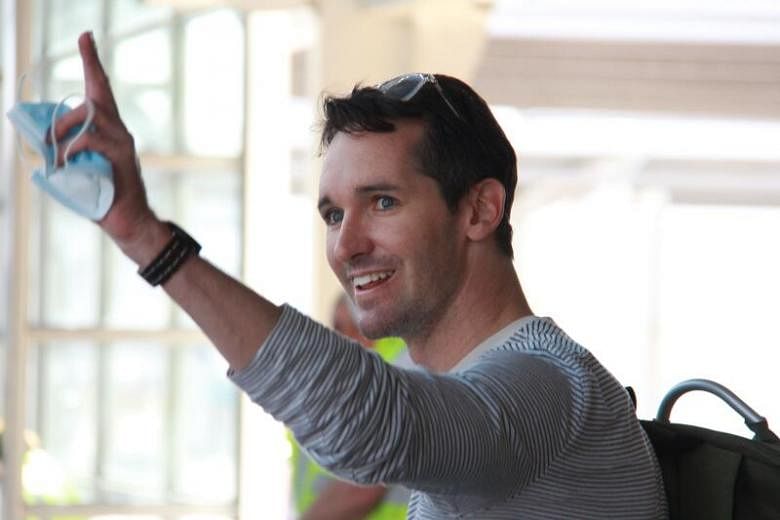SYDNEY/BEIJING - Australia's two remaining journalists in China took shelter in diplomatic missions before hurriedly flying out of the country as tensions between the two nations further deteriorated.
In a development that Australian Foreign Minister Marise Payne labelled "very disappointing", the Australian Broadcasting Corporation (ABC) and the Australian Financial Review removed their respective China correspondents, Mr Bill Birtles and Mr Mike Smith, over concerns about their safety, leaving Australia without a China correspondent for the first time since the 1970s.
The Australian government became concerned about the pair early last week and warned their media outlets that they should leave China. Then, at about 12.30am last Thursday (Sept 3), Chinese security officers visited their homes and informed them they were banned from leaving the country and were to be questioned over a national security case.
Mr Birtles, who is based in Beijing, then took refuge in the Australian embassy, while Mr Smith, who is based in Shanghai, sought protection in the Australian consulate there. Both flew back to Australia on Monday night.
"It's very disappointing to have to leave under those circumstances," Mr Birtles said after arriving in Sydney.
"It's a relief to be back in a country with genuine rule of law. But this was a whirlwind and it's not a particularly good experience."
The departure of the reporters follows the detention last month of Chinese-born Australian journalist Cheng Lei, a presenter for China Global Television Network. Mr Birtles and Mr Smith were questioned by Chinese authorities before leaving and were asked about Ms Cheng.
China said on Tuesday that Ms Cheng was being held on "national security grounds".
A foreign ministry spokesman, Mr Zhao Lijian, did not provide details of the allegations, but said the authorities took "compulsory measures" against her on suspicion "of criminal activity endangering China's national security".
Mr Zhao said China welcomes foreign journalists, and those who obey the law have "no need… to worry".
When asked if the police had targeted only Australian journalists, and whether other Australians were involved in investigations, he said: "China's position has been stated very clearly, and there is no such situation as you mentioned."
Mr Birtles said he knew Ms Cheng but not well. Mr Smith said he had never spoken to her.
Discussing his ordeal, Mr Birtles said he was sad that he had become "a pawn in a much bigger diplomatic stoush".
"My departure is just part of a bigger trend accelerated by Beijing's increasing pursuit of a narrative exclusively on the Communist Party's terms," he wrote on the ABC News website.
"It is a pursuit that will leave both Australians, Chinese and the wider world less informed and less understanding of each other."
The incident marks a further decline in ties between Australia and its largest trading partner in recent years. Beijing has expressed anger at Canberra's foreign interference laws and its recent call for an inquiry into the origins of Covid-19, both of which appeared to be aimed at China. In moves seen as retaliatory, China has imposed tariffs and export bans on Australian goods such as barley and some beef products, although Beijing insisted the measures were not politically motivated.
Ms Payne said on Tuesday that the government became concerned about the safety of Australian journalists in China following the arrest of Ms Cheng. Officials encouraged Mr Birtles and Mr Smith to stay in diplomatic premises while negotiating for the pair to leave the country, she said.
"This is a very disappointing series of events, and I'm also very disappointed that we have major media organisations disrupted in their ability to report on China," she told 2GB Radio.
Ms Payne said Australian officials have had contact with Ms Cheng and were trying to ascertain the reasons for her arrest.
Australian media follows events in China closely and have a strong tradition of providing in-depth coverage of its economic and political affairs. Several Australian correspondents are currently working from Australia after returning home during the Covid-19 pandemic.
A former China correspondent for The Australian and the Financial Times, Mr Richard McGregor, now at the Lowy Institute, said the departures of the two journalist shows "how bad the bilateral relationship is". He told ABC Radio the media environment for foreign correspondents has been worsening and Beijing was targeting journalists, not just from Australia.
The Foreign Correspondents' Club of China condemned Beijing's "unprecedented harassment and intimidation" of the two Australian journalists. It said 17 foreign journalists had been expelled from the country in the first half of 2020.
"Foreign journalists based in China… now face the threat of arbitrary detention for simply doing their work, and difficult circumstances that make it untenable to remain in the country," it said in a statement.
The United States and China have been conducting tit-for-tat assaults on each other's foreign correspondents. Washington on Tuesday accused China of "threatening" and "harassing" foreign journalists after it refused to renew press credentials for at least five journalists at four American media groups, including the Wall Street Journal, CNN and Bloomberg.
Meanwhile, China's Global Times reported yesterday that the Australian intelligence agency recently raided the residences of Chinese journalists in Australia and questioned them, citing unnamed sources.
The Global Times claimed that computers and smartphones were seized and journalists were warned not to report the incident. It also quoted unnamed experts who said "the incident exposed Australia's hypocrisy in upholding so-called 'freedom of the press'".

